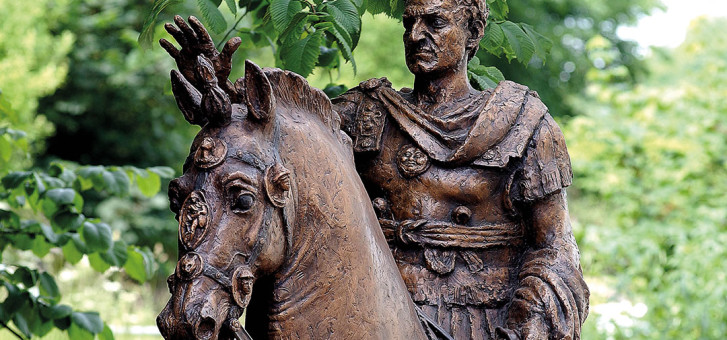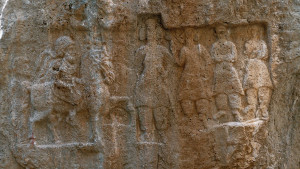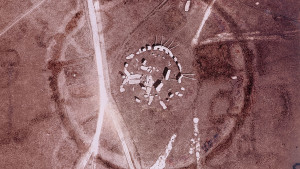In 1776 in England, historian Edward Gibbon published his first volume of The Decline and Fall of the Roman Empire. At that time, the American War of Independence had been raging for almost a year, France still had a king and the British colony at Port Jackson in New South Wales was yet to be founded. Today, despite much time having passed, Gibbon’s work remains essential reading for historians. As a work of history—and literature—this product of Gibbon’s pen is regarded as almost as grand and eloquent as anything produced by the ancient Romans themselves. And of all Rome’s emperors, Gibbon believed Emperor Nerva to be among its finest. And most historians agree with this view. So why is it that we don’t know more about him?
Mature, wise and virtuous, Nerva, who became emperor in AD 96 upon the death of his immediate predecessor, Domitian, placed the long-term welfare of the empire ahead of his own. For this reason, Gibbon is not alone in his praise.
But Nerva’s high reputation was not Gibbon’s invention. In those ancient times, he was loved too. The Roman senator Tacitus, who was also Rome’s greatest historian, wrote in AD 105, that thanks to Nerva, the people of the empire experienced happiness like never before, “for we can think as we please, and speak as we think” (Tacitus, Histories, 1. 1).
And nor is Tacitus alone in this view. The equestrian Suetonius, who composed biographies of Rome’s emperors from Julius Caesar to Domitian, wrote in the early AD 120s that the empire was “richer and happier” under the emperors beginning with Nerva, who possessed, according to Suetonius, more “wisdom and restraint” than those who preceded him (Suetonius, Domitian, 23).
These comments made by Romans who themselves lived under Nerva’s benevolent rule had a profound effect upon how Gibbon and other historians judge Nerva. Gibbon believed Nerva to have been the first of Rome’s five “good emperors”—Nerva, Trajan, Hadrian, Antoninus Pius and Marcus Aurelius—describing them this way:
If a man were called to fix a period in the history of the world, during which the condition of the human race was most happy and prosperous, he would, without hesitation, name that which elapsed from the death of Domitian to the accession of Commodus [successor to Marcus Aurelius]. The vast extent of the Roman Empire was governed by absolute power, under the guidance and virtue and wisdom . . . [its emperors] delighted in the image of liberty, and were pleased with considering themselves as the accountable ministers of the laws.
So who was Emperor Nerva? And why is he remembered so well by historians?
Nerva the Good
Nerva was born on November 8, AD 35, while Tiberius was still ruler, in the Italian city of Narnia, in Umbria just north of Rome. He came from a family of senators and lawyers with close ties to the Julio-Claudian dynasty. Nerva’s own mother, Sergia Plautilla, was the daughter of Octavius Laenas, a former consul, and her brother—Nerva’s own uncle—had married a great-granddaughter of the emperor Tiberius.
As you might expect, as a member of a wealthy, well-connected and famous family, Nerva had a privileged upbringing and the good education that went with it. And as a young adult, he rose quickly through the political ranks. However, it was not until later in life when he became consul with Vespasian, in AD 71, that Nerva began to influence Roman politics. He became a most trusted friend of the Julio-Claudian dynasty’s successors (the Flavians) and in AD 90; Emperor Domitian, Vespasian’s youngest son and the last of the Flavians, again made him consul.
However, in AD 96, Domitian was assassinated and the Flavian dynasty came to an abrupt end. But as things turned out, that would become Nerva’s opportunity to become emperor. After Domitian was killed, his murderers and those who had conspired against him made approaches to a number of Senators with an offer to make one of them emperor. But each one dismissed the overture as something of a joke. They came to Nerva, and exasperated at having no willing body to rule, begged Nerva to believe them. On September 18, AD 96, Nerva was acclaimed as emperor in Rome.
Immediately, relief swept through Rome, as people dared hope for a brighter future after the cruel and despotic rule of Domitian. Nerva would not disappoint. Immediately, Nerva had all of Domitian’s silver and gold statues melted down and his triumphal arches demolished; he publicly repealed the extravagant public spending and lavish personal excesses of his predecessors.
In what was a short reign, Nerva showed himself to be fair, including to the marginalised among his subjects. Jews were treated more respectfully than under previous emperors, even permitting people to become Jews, which was a major turn-around since the sacking of Jerusalem just 26 years earlier. But, while Nerva kept the taxes on Jews, he also came down hard on tax collectors who abused their collection.
Christians, too, were treated well by Nerva. According to the fourth-century Christian historian Eusebius, he had all Christians who had been exiled or imprisoned by Domitian pardoned and released. Among their number was the eminent disciple of Jesus, the apostle John. John had been imprisoned by Domitian on the island-gaol of Patmos, which lies just of the Aegean coast of Turkey. It was there that John penned his biblical Revelation, the last book of the Christian Bible. According to Eusebius, upon his release, John settled in the bustling Roman city of Ephesus, on the west coast of present-day Turkey (see Eusebius, Ecclesiastical History, 3. 20).
Nerva also extended kindness to Rome’s senators, even swearing an oath before the Senate House that he would never put a senator to death. It was an oath he kept, even when he uncovered a conspiracy by a number of senators against himself.
Nerva’s maintenance of the administration of the empire was lauded amongst his contemporaries. But his benevolent style of rule was aimed as much at the welfare of the state as his own. According to Cassius Dio, Nerva, near the end of his life, remarked, “I have done nothing of any sort that would make it impossible for me to lay down the imperial power and return to private life in safety” (Cassius Dio, 68. 3. 1).
Self-preservation or otherwise, Nerva’s concern for the state of the empire was genuine. For example, when the state treasury ran a little short, he sold off his own assets to top it up. He also reduced the tribute owed to Rome by its provinces, which had reached exorbitant levels under Domitian. He also devoted himself to overhauling the public postal service, taking the pressure off the provinces by funding its upkeep himself and from the treasury in Rome.
However, despite Nerva’s capabilities, and as a wise and kind ruler, his advanced years were of cause concern in Rome. The Romans had seen how the death of an emperor could cause civil upheaval across the breadth of the empire, and they were nervous that something similar might happen upon Nerva’s death. Learning of their unease, Nerva adopted Marcus Ulpius Traianus—known simply as “Trajan”—to be publicly pronounced him as his heir and successor. The occasion for the announcement was when news came from Germany that Nerva’s armies had won a great military victory there, in AD 97. Nerva proceeded to the Capitoline hill in the centre of Rome and after making the victory announcement, added, “May good fortune attend the Senate and people of Rome and myself, I hereby adopt Marcus Ulpius Nerva Traianus” (Cassius Dio, 63. 3. 4).
It was a momentous announcement, and caused the Roman audience to erupt in celebration. But the choice was not without critics. Nerva had, after all, other relatives living, and Trajan was not even a native of Rome. In fact, he wasn’t even from Italy, although a Roman citizen, rather from Spain. However, Trajan was a brilliant military general and an admired among the legions. He was governor of Upper Germany and head of the province’s vast army.
But if the choice of Trajan was not strictly dynastic, it was nevertheless sensible, as it ensured the stability and civil harmony of the entire empire. When Nerva died from old age less than one year later, the wisdom and foresight of Nerva’s choice of successor became apparent: there would be no civil war and the empire flourished as never before.
Nerva’s days as Emperor numbered just one year, four months and nine days, but in that short time he demonstrated statesmanship and wisdom far exceeding all predecessors. By adopting Trajan, Nerva may have offended his own relatives—Trajan may even have pressured him into it—but he showed that he put the interests of the empire ahead of his own and avoided a war of succession. In fact, Rome would not be engulfed by another civil war for almost a century.
After his death, Nerva’s body was interred in the mausoleum of Augustus in a state funeral led by the Roman Senate. He was deified by the new emperor, Trajan, and the Senate, a few days later. Such was the high regard that Romans had for Nerva.
Nerva’s popularity among historians is neither nominal nor sentimental, his reputation as a wise ruler is not hagiographic. Nerva had worked hard to unite Romans right around the empire. As for Nerva’s successor Trajan, he learned from Nerva’s example, and attempted to maintain Nerva’s fairness at court and in the streets. But it was tempered with his military exploits, which will be explored in the next issue.






